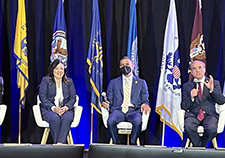Office of Research & Development |
 |


A VA study examining COVID-19 and tobacco use found older male Veterans, plus those with immunodeficiency, or endocrine or lung diseases, to be at higher risk of death. Smoking predicted mortality above and beyond those factors. (Photo for illustrative purposes only. ©iStock_Juan Monino)
October 6, 2021
By Mike Richman
VA Research Communications
"Given that COVID-19 has a particularly strong impact on lung functioning, it made sense that a history of cigarette smoking would negatively impact the course of COVID-19."
In March 2020, the Southeast Louisiana VA in New Orleans identified the first COVID-19 positive patient in the state and proceeded to care for a surge of Veterans with the virus.
Dr. Amanda Raines, a clinical scientist at that VA hospital, halted her research on Veteran PTSD to focus on COVID-19.
“While frontline providers quickly mobilized to manage the immediate needs of patients,” she says, “my colleagues and I put our research skills to use looking for key answers that could inform the broader VA, the nation, and the world about the impact of this deadly disease.”

Dr. Amanda Raines is a clinical scientist at the Southeast Louisiana VA.
In one of her studies, Raines led research that examined risk factors for COVID-19 deaths among Veterans, namely lifetime tobacco use. In a study population of 440 Veterans, about half were lifetime tobacco users, which meant they smoked at some point in their life. The average age of the predominantly male cohort was 61.
Raines and her team found that older male Veterans, plus those with immunodeficiency or endocrine or lung diseases, were at higher risk of death, with lifetime tobacco use predicting mortality above and beyond those factors. Immunodeficiency is a failure of the immune system to adequately protect the body from infections. The endocrine system consists of glands and organs that make hormones and release them into the blood so they can travel through the body.
“Findings highlight the importance of assessing for lifetime tobacco use among [COVID-19] positive patients and the relative importance of lifetime tobacco use as a risk factor for increased death,” the researchers write.
The study results appeared in the journal Addictive Behaviors in February 2021.
“Cigarette smoking is the leading cause of preventable death in the United States,” Raines says. “Smoking is also known to cause and increase risk for a number of physical health conditions including cancer, heart disease, and chronic obstructive pulmonary disease [COPD]. Given that COVID-19 has a particularly strong impact on lung functioning, it made sense that a history of cigarette smoking would negatively impact the course of COVID-19.

VA Study Documents Health Risks for Burn Pit Exposures

AI to Maximize Treatment for Veterans with Head and Neck Cancer

Under Secretary of Health, panel of experts discusses PACT Act impacts for Veterans

VA researcher works to improve antibiotic prescribing for Veterans
“The findings, coupled with the well-known negative health consequences of tobacco use, underscore the continued need for tobacco cessation efforts within VA and other health care systems,” she adds.
COPD is a group of respiratory diseases that limit airflow and make it hard to breathe. It’s usually linked to an abnormal inflammatory response in the lungs to noxious particles or gases, such as cigarette smoke.
Because of the known health problems and co-occurring health conditions that smoking can cause, isn’t it obvious that tobacco use would exacerbate the condition of Veterans with COVID-19 who were also smokers? COVID-19 is a respiratory disease that can scar the lungs and cause a range of breathing problems.
“Exacerbate, yes,” Raines says. “But to predict death above and beyond almost all known demographic and medical correlates of COVID-19 was rather surprising. This finding underscores the need for more research in this area.”
According to Raines, her study was among the first to examine retrospective risk factors for COVID-19 deaths among Veterans, including lifetime tobacco use. The U.S. Centers for Disease Control and Prevention (CDC) issued guidance on smoking and COVID-19 before her study was published, warning against tobacco use largely because of its potential negative impact on those who contract the virus. Raines says her study confirms the CDC’s conclusion and extends its findings to Veterans.
Raines and her colleagues reviewed the electronic health records of 440 Veterans who tested positive for COVID-19 from March 11, 2020, to April 23, 2020, at the Southeast Louisiana VA. More than 80% of the Veterans were Black, a statistic that reflects the demographics of the New Orleans area, Raines says.
“Notably, we also know that COVID-19 has had a disproportionate impact on Black-African American people, so our findings may be particularly relevant to understanding the disease course in this population,” she says.
Thirty-two out of the 440 Veterans in the cohort—or 7.3%--died from COVID-19. Of those who died, nearly 90% were lifetime smokers. They were also an average of 13 years older than those who lived; race, gender, and body mass index led to no group differences. Notably, the researchers also found that lifetime tobacco use was highly associated with COVID-19 mortality, above and beyond the included demographic and medical conditions. The Veterans who endorsed lifetime tobacco use were more than twice as likely to die from COVID-19, compared with those who did not.
“These findings are consistent with available information indicating that older adults, people with chronic lung disease and diabetes, and those who are immunocompromised may be at higher risk for severe illness within the context of COVID-19,” the researchers write. “Additionally, these findings are consistent with the limited information available among Veterans that highlight the association between various medical conditions, namely pulmonary and endocrine diseases, and COVID-19 positive status.”
Given their method of data collection, the researchers were unable to determine the extent to which tobacco was used or even what type of tobacco was used. “Results may vary depending on the number of cigarettes smoked or the type of tobacco product used,” Raines says. “Such information will be important to gather in future studies.”
VA Research Currents archives || Sign up for VA Research updates